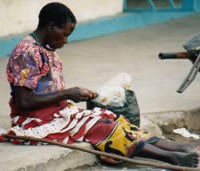Nyamwanga in Tanzania

Photo Source:
Anonymous
|
Send Joshua Project a map of this people group.
|
| People Name: | Nyamwanga |
| Country: | Tanzania |
| 10/40 Window: | No |
| Population: | 285,000 |
| World Population: | 502,000 |
| Primary Language: | Nyamwanga |
| Primary Religion: | Christianity |
| Christian Adherents: | 85.00 % |
| Evangelicals: | 12.00 % |
| Scripture: | Complete Bible |
| Ministry Resources: | Yes |
| Jesus Film: | Yes |
| Audio Recordings: | Yes |
| People Cluster: | Bantu, Central-Tanzania |
| Affinity Bloc: | Sub-Saharan Peoples |
| Progress Level: |
|
Introduction / History
The Nyamwanga, also known as Mwanga, are a Bantu ethnic group residing in southwestern Tanzania, particularly in the Rukwa and Mbeya regions near the border with Zambia. They are part of the Central Tanzania Bantu cluster and share cultural and linguistic ties with neighboring groups, such as the Fipa, Mambwe, and Nyiha. Though divided by modern national borders, the Nyamwanga maintain strong cross-border connections with their kin in Zambia.The Nyamwanga speak the Nyamwanga language (also known as Chinamwanga), a Bantu language closely related to other regional dialects. Historically, the Nyamwanga trace their origins to northeastern Africa and migrated southward alongside other Bantu-speaking peoples. Before colonial boundaries were drawn, the Nyamwanga in Tanzania and Zambia shared leadership and cultural practices. Today, traditional leadership structures still exist, with chiefs and royal figures playing ceremonial roles. The Tanzanian side remains the cultural and historical center of the group, with the king of the Nyamwanga based in Tanzania.
What Are Their Lives Like?
Nyamwanga communities are largely rural and depend on agriculture and livestock for their livelihoods. They cultivate crops such as maize, beans, and cassava, and raise cattle and goats. Social life is organized around extended families and clan affiliations, with elders and chiefs holding significant influence. Traditional ceremonies such as Vikamkanimba and Chambo Chalutanga are still practiced, reflecting a rich cultural heritage. Access to education and healthcare is limited in many areas, and infrastructure development remains slow.
What Are Their Beliefs?
Christianity is the dominant religion among the Nyamwanga, with Roman Catholicism and mainline Protestant denominations being most prevalent. However, evangelical Christianity has a modest presence. While many identify as Christian, traditional beliefs and practices—such as reverence for ancestors and nature-based rituals—are still influential, especially in rural areas. Syncretism is common, and there is a need for deeper biblical understanding and discipleship.
What Are Their Needs?
The Nyamwanga need access to culturally relevant gospel resources in their heart language. Although Bible translations and gospel recordings exist in Nyamwanga, there is a lack of trained local leaders to guide spiritual growth. Many Christians have only a nominal understanding of their faith, and traditional beliefs often coexist with Christian practices. Discipleship programs, oral Bible storytelling, and community-based teaching could help deepen their engagement with Scripture. Additionally, holistic development efforts in education, healthcare, and clean water would support both physical and spiritual transformation.
Prayer Points
Please pray for the development and distribution of discipleship materials in the Nyamwanga language, asking God to raise up Nyamwanga believers who can lead their communities in biblical truth.Pray for spiritual renewal among nominal Christians and for discernment to separate biblical faith from traditional practices.Intercede for Nyamwanga workers to spread Christ's ways to the least-reached parts of Africa.Pray for Nyamwanga Christians to be equipped and encouraged.Pray for God to pave the way for improved access to education, healthcare, and clean water.